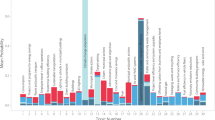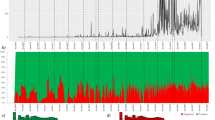Abstract
Anthropogenic climate change represents a global threat to human well-being1,2,3 and ecosystem functioning4. Yet despite its importance for science and policy, our understanding of the causes of widespread uncertainty and doubt found among the general public remains limited. The political and social processes driving such doubt and uncertainty are difficult to rigorously analyse, and research has tended to focus on the individual-level, rather than the larger institutions and social networks that produce and disseminate contrarian information. This study presents a new approach by using network science to uncover the institutional and corporate structure of the climate change counter-movement, and machine-learning text analysis to show its influence in the news media and bureaucratic politics. The data include a new social network of all known organizations and individuals promoting contrarian viewpoints, as well as the entirety of all written and verbal texts about climate change from 1993–2013 from every organization, three major news outlets, all US presidents, and every occurrence on the floor of the US Congress. Using network and computational text analysis, I find that the organizational power within the contrarian network, and the magnitude of semantic similarity, are both predicted by ties to elite corporate benefactors.
This is a preview of subscription content, access via your institution
Access options
Subscribe to this journal
Receive 12 print issues and online access
$209.00 per year
only $17.42 per issue
Buy this article
- Purchase on Springer Link
- Instant access to full article PDF
Prices may be subject to local taxes which are calculated during checkout



Similar content being viewed by others
References
Hsiang, S. M., Burke, M. & Miguel, E. Quantifying the influence of climate on human conflict. Science 341, 1235367 (2013).
Kennett, D. J. et al. Development and disintegration of Maya political systems in response to climate change. Science 338, 788–791 (2012).
Thomas, C. D. et al. Extinction risk from climate change. Nature 427, 145–148 (2004).
IPCC Climate Change 2014: Impacts, Adaptation, and Vulnerability. Part B: Regional Aspects (eds Barros, V. R. et al.) 1133–1731 (Cambridge Univ. Press, 2014).
Leiserowitz, A. et al. Climate Change in the American Mind: April 2014 (Yale Project on Climate Change Communication, 2014); http://environment.yale.edu/climate-communication/article/climate-change-in-the-american-mind-april-2014.
McCright, A. M. & Dunlap, R. E. Defeating Kyoto: The conservative movements impact on U. S. Climate Change Policy. Soc. Probl. 50, 348–373 (2003).
Oreskes, N. & Conway, E. M. Merchants of Doubt (Bloomsbury, 2010).
Brulle, R. J. Institutionalizing delay: Foundation funding and the creation of U.S. climate change counter-movement organizations. Climatic Change 122, 681–694 (2014).
Akerlof, K., Rowan, K. E., Fitzgerald, D. & Cedeno, A. Y. Communication of Climate Projections in US media amid politicization of model science. Nature Clim. Change 2, 648–654 (2012).
Ding, D., Maibach, E. W., Zhao, X., Roser-Renouf, C. & Leiserowitz, A. Support for climate policy and societal action are linked to perceptions about scientific agreement. Nature Clim. Change 1, 462–466 (2011).
Hart, P. S. & Nisbet, E. C. Boomerang effects in science communication: How motivated reasoning and identity Cues amplify opinion polarization about climate mitigation policies. Commun. Res. 39, 701–723 (2012).
Leiserowitz, A., Maibach, E. W., Roser-Renouf, C., Smith, N. & Dawson, E. Climategate, public opinion, and the loss of trust. Am. Behav. Sci. 57, 818–837 (2013).
Evans, J. H. & Feng, J. Conservative Protestantism and skepticism of scientists studying climate change. Climatic Change 121, 595–608 (2013).
Shove, E. Beyond the ABC: Climate change policy and theories of social change. Environ. Plan. 42, 1273–1285 (2010).
Maniates, M. Individualization: Plant a tree, buy a bike, save the World? Glob. Environ. Polit. 1, 31–52 (2001).
King, G., Pan, J. & Roberts, M. E. Reverse-engineering censorship in China: Randomized experimentation and participant observation. Science 345, 1251722 (2014).
Lazer, D. et al. Computational social science. Science 323, 721–723 (2009).
Watts, D. J. A twenty-first century science. Nature 445, 489 (2007).
King, G. Ensuring the data-rich future of the social sciences. Science 331, 719–721 (2011).
Boykoff, M. T. & Boykoff, J. M. Balance as bias: Global warming and the US prestige press. Glob. Environ. Change 14, 125–136 (2004).
Wild, F. lsa: Latent Semantic Analysis. R package version .073 (R Foundation for Statistical Computing, 2014); https://cran.r-project.org/web/packages/lsa/index.html.
Easley, D. & Kleinberg, J. Networks, Crowds, and Markets: Reasoning About a Highly Connected World (Cambridge Univ. Press, 2010).
Walker, E. T. Privatizing participation: Civic change and the organizational dynamics of grassroots lobbying firms. Am. Sociol. Rev. 74, 83–105 (2009).
Morris, M. & Western, B. Inequality in earnings at the close of the twentieth century. Annu. Rev. Sociol. 25, 623–657 (1999).
Kristal, T. Good times, bad times: Postwar labors share of national income in capitalist democracies. Am. Sociol. Rev. 75, 729–763 (2010).
Gewin, V. Funding: Flirting with disaster. Nature 498, 527–528 (2013).
Morello, L. More cuts loom for US science. Nature 501, 147–148 (2013).
Edwards, S. A. Science and the billionaire philanthropists. Capitol Connection (6 May 2013); http://membercentral.aaas.org/blogs/capitol-connection/science-and-billionaire-philanthropists.
Acknowledgements
I want to thank Yale University, the Stanford University Center for Computational Social Science, and several conversation partners, including J. Bayham, R. Dunlap, R. Brulle, B. Stewart, J. Wilkerson, R. Wuthnow, M. Evans and K. Beyerlein. This research was partially supported by an EPA STAR graduate fellowship.
Author information
Authors and Affiliations
Corresponding author
Ethics declarations
Competing interests
The author declares no competing financial interests.
Supplementary information
Rights and permissions
About this article
Cite this article
Farrell, J. Network structure and influence of the climate change counter-movement. Nature Clim Change 6, 370–374 (2016). https://doi.org/10.1038/nclimate2875
Received:
Accepted:
Published:
Issue Date:
DOI: https://doi.org/10.1038/nclimate2875
This article is cited by
-
Climate change countermovements and adaptive strategies: insights from Heartland Institute annual conferences a decade apart
Climatic Change (2024)
-
Nuclear denial in Japan: the network power of an energy industrial complex
Theory and Society (2024)
-
Do fossil fuel firms reframe online climate and sustainability communication? A data-driven analysis
npj Climate Action (2023)
-
Facilitating system-level behavioural climate action using computational social science
Nature Human Behaviour (2023)
-
Psychological inoculation strategies to fight climate disinformation across 12 countries
Nature Human Behaviour (2023)



